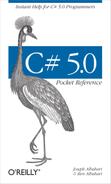Preprocessor directives supply the compiler with additional information about regions of code. The most common preprocessor directives are the conditional directives, which provide a way to include or exclude regions of code from compilation. For example:
#define DEBUGclass MyClass { int x; void Foo() {# if DEBUGConsole.WriteLine ("Testing: x = {0}", x);# endif}... }
In this class, the statement in Foo is compiled as conditionally dependent upon
the presence of the DEBUG symbol. If we
remove the DEBUG symbol, the statement is not compiled.
Preprocessor symbols can be defined within a source file (as we have
done), and they can be passed to the compiler with the /define:symbol command-line
option.
With the #if and #elif directives, you can use the ||, &&, and ! operators to perform or,
and, and not operations on
multiple symbols. The following directive instructs the compiler to
include the code that follows if the TESTMODE symbol is defined and the DEBUG symbol is not defined:
#if TESTMODE && !DEBUG ...
Bear in mind, however, that you’re not building an ordinary C# expression, and the symbols upon which you operate have absolutely no connection to variables—static or otherwise.
The #error and #warning symbols prevent accidental misuse of
conditional directives by making the compiler generate a warning or error
given an undesirable set of compilation symbols.
Here is a complete list of preprocessor directives:
Preprocessor directive | Action |
|---|---|
Defines | |
Undefines | |
Conditional compilation (operators are | |
Executes code to subsequent | |
Combines | |
Ends conditional directives. | |
| |
| |
| |
Marks the beginning of an outline. | |
Ends an outline region. | |
See the next section. |
The compiler generates a warning when it spots something in your code that seems unintentional. Unlike errors, warnings don’t ordinarily prevent your application from compiling.
Compiler warnings can be extremely valuable in spotting bugs. Their usefulness, however, is undermined when you get false warnings. In a large application, maintaining a good signal-to-noise ratio is essential if the “real” warnings are to get noticed.
To this effect, the compiler allows you to selectively suppress
warnings with the #pragma warning
directive. In this example, we instruct the compiler not to warn us
about the field Message not being used:
public class Foo
{
static void Main() { }
#pragma warning disable 414
static string Message = "Hello";
#pragma warning restore 414
}Omitting the number in the #pragma
warning directive disables or restores all warning
codes.
If you are thorough in applying this directive, you can compile
with the /warnaserror switch—this
tells the compiler to treat any residual warnings as errors.
